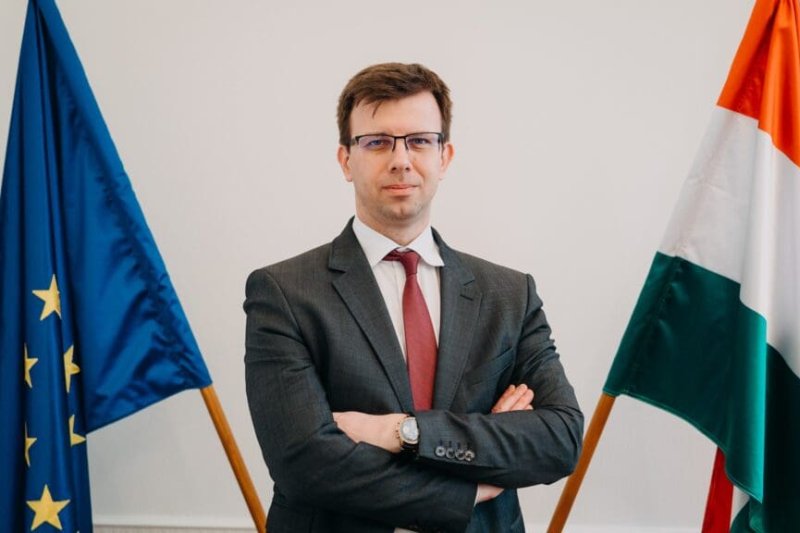Hungary, a Fair and Honest Broker
As Hungary is about to take the EU rotating Presidency for the second half of 2024, the Hungarian Minister of EU Affairs, Mr. Janos Boka is paying an official visit to Albania. We had the opportunity to interview Mr. Boka, whose country’s stated priorities regarding this very important mission, is of course, enlargement.
Hungarian Minister delves more in depth on Hungarian Presidency’s main priorities, while reminding the reader that these priorities are part of the joint trio presidency programme adopted by the European Council, which started with Spanish presidency in July 1, 2023, and continued with Belgium right after.
“The Hungarian Presidency is committed to a credible and merit-based enlargement policy. The European Union cannot be complete without the accession of the Western Balkans, which would benefit the Union from economic, security and geopolitical perspectives. Our aim is to make progress with preferably all countries of the Western Balkans,” says Hungarian Minister of EU Affairs, Janos Boka, among other things.
- Your Excellency, on behalf of Albanian Daily News readers, thank you for this opportunity. The Hungarian rotating EU Presidency comes at a most challenging period for the Union; the Ukraine and Gaza conflicts are ongoing, while the EU is about to hold its elections amid a series of internal issues that need addressing. I would like a comment about this complicated panorama and on Hungary’s expectations for its new task. Could you shed some light on your country’s priorities (I understand they are about to be announced officially in mid-June) or at least, Budapest’s main directions or objectives regarding the EU Presidency?
- EU Council presidencies work closely together in groups of three, called 'trios'. The current trio presidency, of which Hungary is a member, runs from 1 July 2023 and includes Spain, Belgium and Hungary. The priorities of the Hungarian presidency are based on the joint trio presidency programme adopted by the Council itself. These priorities focus – among others – on the competitiveness of the European Union, demographic challenges, migration, in particular its external dimension and of course enlargement.
More specifically we will put special emphasize on the adoption of a New European Competitiveness Deal. In our view we can contribute to the global competitiveness of the European Union through global trade and economic relations, through connectivity. This is very timely since the EU is lagging behind its global competitors. In and around Europe military conflicts are going on, therefore we should reinforce our military capabilities by strengthening the European defence on European industrial and technological bases, including defence innovation, and enhancing cooperation between Member States in defence procurement. The Hungarian Presidency is committed to a credible and merit-based enlargement policy. The European Union cannot be complete without the accession of the Western Balkans, which would benefit the Union from economic, security and geopolitical perspectives. Our aim is to make progress with preferably all countries of the Western Balkans. The migratory pressures that have been affecting Europe for years are not only a challenge for the Union as a whole, but also place a huge burden on individual Member States. The Hungarian Presidency will put special focus on the external dimension of migration, such as effective cooperation with the third countries concerned. One of the key objectives of the Hungarian Presidency will be to hold a high-level strategic debate on the future of cohesion policy. In our view cohesion policy is one of the most successful policies of the European Union and it should be kept in its current form. A farmer-oriented European agriculture is in the interest of all the community, the Hungarian Presidency will therefore take efforts to give inputs to create a competitive, crisis-resilient and farmer-friendly European agriculture in the upcoming years. And last, but not least demographic challenges will be addressed at Council level.
- Hungary is a supporter of enlargement and specifically, of further encouragement for the Western Balkans’ swifter steps toward the EU membership. Can you share with us whether you have a roadmap or a list of activities in this direction?
- Hungary strongly supports the integration of the Western Balkan region, for this reason one of the main priorities of our Presidency will be enlargement, and the Western Balkan region will be put in the limelight. At the moment we are just before the European elections and a number of national elections, their outcome and other political developments could change the attitude of the EU institutions and of the member states towards the enlargement of the European Union. For these reasons we will present our specific activities at the beginning of our Presidency, however, what I can assure is that at every possible forum we will support the integration of the Western Balkan region and the Hungarian Presidency will take every opportunity to help each and every country of the region to make a step ahead in the integration process.
- It is not a secret that Hungary’s stance differs from that of other EU members on various issues. How will this affect the efficacy of the EU Presidency mandate, according to your opinion?
- We want to ensure that the Hungarian EU Presidency does not become a victim of political battles. That is one of the main reasons why the full programme will be published after the European elections.
Our fundamental objective is that the Presidency is seen by all as a fair and honest broker, working sincerely with the institutions and other Member States. We are aware that the Member States and the institutions will perhaps watch the Hungarian Presidency more closely than they do with other Presidencies, and perhaps the expectations will be higher than they would otherwise be, but that is not a problem for us: we will meet those higher expectations, we are prepared to do so.
- Mr. Minister, how would you assess Albania’s progress in the EU integration process so far? Adding the New Growth Plan into the mix, do you think the “Western Balkans in EU by 2030” goal is realistic?
- Albania has maintained an outstanding performance over the past years. Albania is a great example for the transformative power of the enlargement process. Hungary has long been one of the strongest supporters of the accession of Albania. I was, therefore, happy to see that the accession negotiations started in 2022. Albania has proved that the start of the negotiations can be a real motivation for candidate countries. I am glad that Albania even accelerated the preparations. During our Presidency, Hungary would be ready to acknowledge this performance by opening more clusters. The Growth Plan is an important tool but I would not link it directly to the accession process. The role of the Growth Plan is to connect the EU and the Western Balkans in a way that makes cooperation stronger even before the accession of the countries of the region. I hope that the swift accession of Albania and other countries will mean that the Growth Plan can be phased out soon. I would not go into the date game, though. Many Member States want to avoid the 2030 date because they are afraid that it can be too early. On my part, I think the other way around: why wait until 2030, if candidate countries are ready to join before that? The enlargement process should be merit-based and whoever is ready, should join. Therefore, in my view, it is more important to be ready for the accession of new Member States when we decide on the next seven-year budget than talking about any dates.
- The special relations and the cooperation between Hungary and Albania go way back in time, but history aside, Hungarian presence in our economy has been increasing recently. How would you assess the current state of affairs in the bilateral relations and which would be the sectors with untapped potential?
- Indeed, the relationship between Hungary and Albania has a long history: already in the 15th century, Skenderbeu and János Hunyadi, - our hero protecting the southern borders of the Kingdom of Hungary - fought together against the troops of the Turkish sultan. In recent years a number of bilateral meetings of the highest political level took place between the prime ministers and the presidents of Hungary and Albania. Besides the historical, cultural and political ties Hungary and Albania have, their foreign economic relations are also on solid foundations. In the last five years there has been an increase in the export of Hungarian goods, and the bilateral trade turnover has been over 100 million euros in the same period. Hungarian companies are already present in different sectors: banking, telecommunications and transport. We are hoping for a growth in all these sectors. Increased activity on behalf of Albanian economic players in Hungary is also welcome in the spirit of reciprocity and mutual benefits. /ADN














